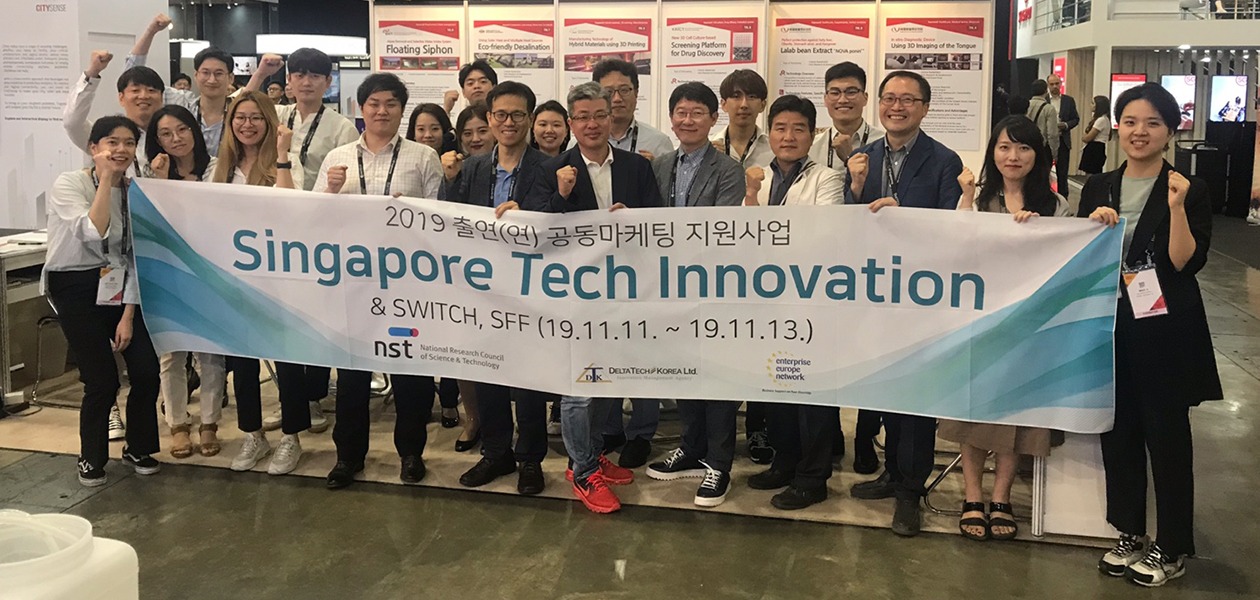Leveraging the latest technology and networks in Korea
The story of the light bulb did not begin with Thomas Edison—and it doesn’t end with him either. From as early as 80 years before Edison’s first light bulb invention, scientists around the globe had been developing electric batteries and lamps that would later contribute to the incandescent bulb. Even now, developments are being made for better and more efficient lighting.
With the understanding that game-changing technology is never the result of one mind alone, companies have turned to open innovation to help them develop unique products. Just this year, Korean auto maker Hyundai and Dublin-based self-driving technology firm Aptiv set up an innovation facility in Singapore. The sparkling high-tech centre is a testament to the cross-border open innovation that DeltaTech-Korea is looking to achieve.
With their community of start-ups, industry leaders and research institutions, DeltaTech-Korea facilitates new and unique ideas by forging partnerships between companies and innovators. DeltaTech-Korea’s CEO, Ho S. Lee shares his experiences and thoughts on becoming an open innovation bridge between Singapore and Korea.
1. What makes Korea an attractive innovation destination and how does DeltaTech fit within the overall Korean innovation landscape?
Korea is well-known as an innovative nation. It has a medium-sized market with high GDP (gross domestic product) per capita, speedy internet infrastructure and consumers looking for the best low-cost products and services—all of which put it as the fifth research and development (R&D) activity and test-bed market in the world. A particularly attractive country for foreign start-ups, Korea has a variety of acceleration programmes, networking events with local entrepreneurs, and comprehensive visa issuance schemes.
Companies implement open innovation practices in different ways: alliances with other organisations, research departments in universities, crowdsourcing competitions, innovation ecosystems and so on. However, one of the greatest challenges is to break away from the silo mentality and secrecy traditionally associated with R&D culture.
In 2000, DeltaTech-Korea was set up as an open innovation accelerator to bridge the gap between industry and academia, and to generate revenue for intellectual property with an extensive network of public and private sector contacts. DeltaTech-Korea’s main businesses are technology transfer and the sale of new products with the goal of getting start-ups to work with research partners and collaborate on exciting new technologies in the market.
2. What is unique about DeltaTech-Korea's approach to open innovation, whether it is in Korea or elsewhere in the world?
Any open innovation project involves considerable costs, like business trip expenses, intellectual property rights registration, valuation, sales promotion and more. To deal with this, DeltaTech-Korea harnesses technology to enable digital transformation that will increase productivity and cut costs.
For example, DeltaTech-Korea has developed marketing software for customer relationship management, event management and intellectual property for e-commerce. The software allows DeltaTech-Korea to conduct online B2B events and targeted digital marketing easily.
As the Korean branch of Technology Innovation International (TII), DeltaTech-Korea has a strong business network. TII is a global online community that helps start-ups, firms and universities commercialise their inventions and new technologies. They also run programmes that maximise the returns from the research developed in a specific region. Together with TII members abroad, DeltaTech-Korea strives to develop global projects such as joint R&D, start-up internationalisation, networking events and marketing.
3. Kindly share some examples of how collaborations with DeltaTech Korea have benefited companies.
DeltaTech-Korea provides international companies access to Hot Tech Watch, a listing of new technologies and inventors in Korea. Hot Tech Watch enables open innovation managers to be on top of technology trends and identify providers like university researchers, start-ups and established companies, which would be the first step to explore open innovation projects with Korean partners.
For foreign SMEs, DeltaTech-Korea has a Soft Landing Service which supports business expansion into the Korean market as painlessly as possible. While their business grows in Korea, a specialised task team will assist with searching for working spaces, networking, market analysis and interpretation, etc. Companies are welcome to apply for this service anytime. The application process will start with an interview, followed by a needs assessment and finally, a tailored partnership programme.
4. What kinds of companies and collaborators are you looking to work with from Singapore?
There are several open innovation challenges in healthcare, trade and connectivity, and cleaning and waste management sectors in Singapore, some of which are also supported by IPI. DeltaTech-Korea wants to support Singapore-based companies and government agencies for these open innovation challenges, and bring forward as many applications as possible from technology providers in Korea.
Global corporations and government agencies have also implemented a few start-up accelerator programmes in Korea which have organised innovation challenges that allow foreign start-ups to take part and benefit from cash grants, fast-track networking, visa issuance and co-working spaces. DeltaTech-Korea also provides mentoring services for Singaporean SMEs interested in the Korean market and would be able to help start-ups from Singapore apply, pitch and handle logistics for such events as a local agent.
IPI has greatly contributed to the international open innovation market through crowd pitching, crowd sourcing and B2B matching on their innovation marketplace. As an operator of an online marketplace ourselves, we should like to share our e-marketplace operating experiences and expertise in composing sales materials. In addition, DeltaTech-Korea would like to build a strong open innovation network between Singapore and Korea with IPI’s help.
5. What are three key areas that Singapore’s enterprises and SMEs should focus on to successfully engage in open innovation with DeltaTech-Korea’s clients today?
Korea’s open innovation market is steadily growing, particularly in the healthcare, Internet of Things and mobility sectors. DeltaTech-Korea hopes to build a community with large enterprises like Samsung, Hyundai, Korea Electric Power Corporation, KT Corporation, SK Group, LG Corporation and LX Corporation for technology transfer and joint venture collaborations. Singapore SMEs and start-ups who are looking to enter the dynamic Korean market with new products or technologies are welcome to reach out to us.

